Find free South Dakota divorce records by searching the proper record custodians described throughout this resource.
Divorce records allow interested persons to find out if another person has had a dissolution of a marriage, while the absence of the records could indicate that a person is married.
Thankfully, certain divorce records are public in South Dakota; specifically, informational copies of divorce records are public, meaning anyone can request divorce records for any lawful reason.
Follow this resource to learn how to look up divorce records for free and obtain records in South Dakota.
Accessing Records of Divorce in South Dakota
On its face, it would appear that the disclosure of information or the inspection of vital records is not permitted in South Dakota based on its vital record copying law (South Dakota Administrative Rule 44:09:06:02).1
The law seeks to protect the integrity of vital records by not permitting employees of the state vital records office and local agencies to make copies of records unless authorized by another law – the informational records copying law.2
This South Dakota law provides that the state vital records office and local agencies must issue an information copy of a vital record to anyone who supplies an application.
The law distinguishes between an informational copy of a divorce certificate and a certified copy. Certified copies of vital records may only be issued to certain eligible persons including:
- Spouse
- Children
- Parents
- Next of Kin
- Authorized Representative
The law also establishes that a fee must be paid by any applicant before a certificate is provided. More on the specifics of how to obtain divorce records in the section below.
Additionally, interested persons may view recent divorce rates posted by the U.S. Census Bureau for free.3 In South Dakota, approximately 10.6% of the adult population is divorced.
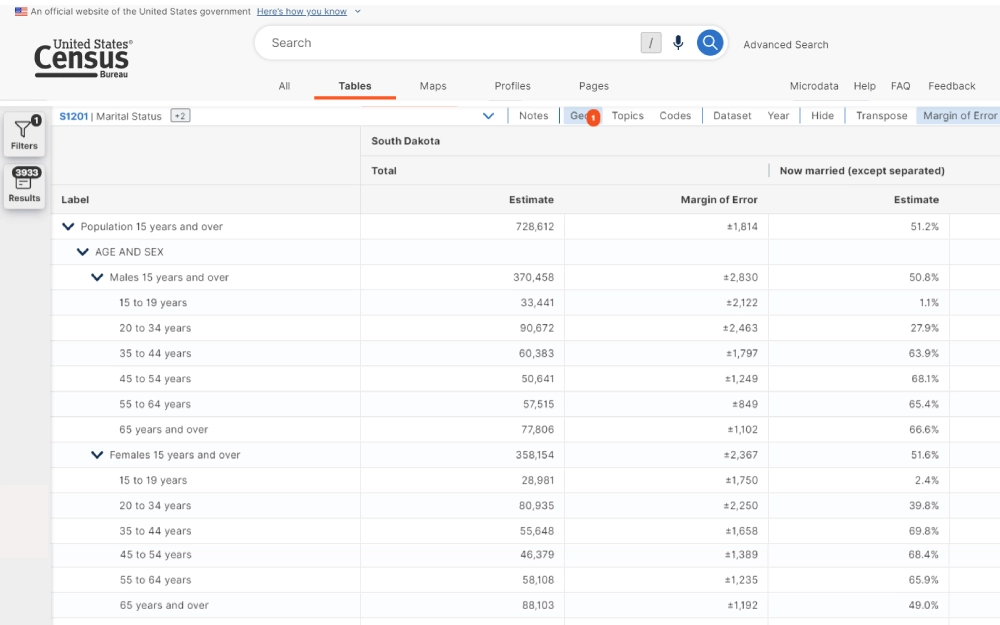
How To View & Obtain Free South Dakota Divorce Records
Those interested in a free public divorce records search are in luck. South Dakota divorce information may be viewed for free by utilizing the divorce index. In order to use this system, interested persons must create a free ecourt account.
To specifically search for public divorce records, interested persons must select the case lookup tab and check the advanced search box. Located in the case type dropdown menu is an option to check divorce.
Ensure that every other option is deselected so the results will only yield divorce cases. Interested persons may also further narrow their search by county in the case location drop-down menu.
When searching an individual’s name, users only need to input a last name for the search to yield results. However, the search function is limited, and if too many results are generated the system will simply not provide them. Users should also input a first name to avoid this issue.
Once results are provided, users will be able to view individual divorce cases by name. Additional information pertaining to the divorce case is also provided including:
- Birth year of individual
- Gender
- City and zip code of individual
- Case number
- Case parties
- Case status
- Filing date
- County where divorce was filed
Divorce cases that have not been resolved will be indicated as pending, and those already resolved will be indicated as terminated.
Physical copies of records require fee payment. Each document costs $0.10 per page with a maximum of $3 per document.
The South Dakota Supreme Court maintains this system. Contact the court if you have questions.
Supreme Court of South Dakota
500 E. Capitol Ave.
Pierre, South Dakota 57501
Phone: 605.773.3511
How To Order Divorce Records Through the South Dakota Department of Health
In South Dakota, divorce records may also be ordered by anyone who completes an application and pays the appropriate fees.
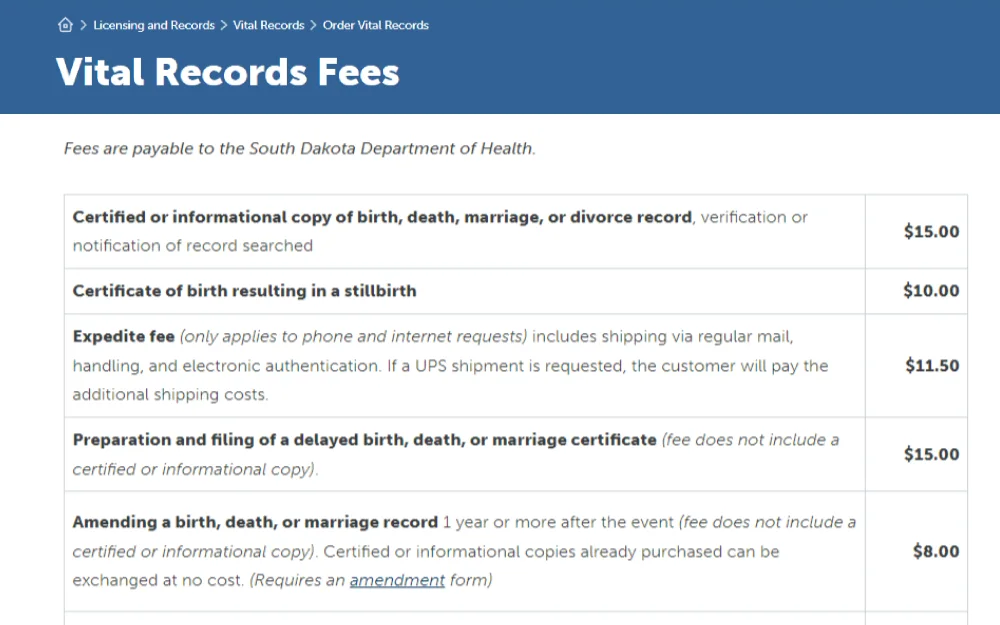
The South Dakota Department of Health allows any member of the public to order informational copies of divorce records.5 Certified records are only issued to those named on the record, their spouse, parents, children, guardian, next of kin, or an authorized representative. These persons may be required to provide proof of the relationship before certified divorce records are issued.
The South Dakota Department of Health allows members of the public to order divorce records in person, by mail, over the phone, and online.
In Person: To order in person, interested persons must fill out a South Dakota vital records request.6 The bottom of the first page is the marriage and divorce section. Select divorce, fill out the names of both spouses to the divorce, and check the type of copy you are requesting.
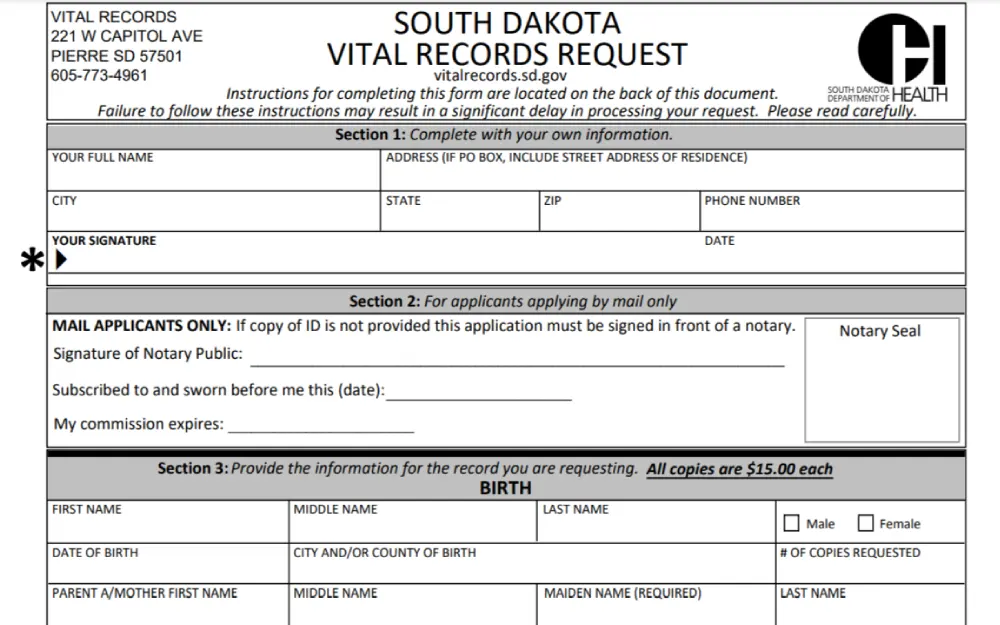
There is a $15 fee per record. There is an additional $2.50 surcharge if paid using a debit or credit card. A valid photo ID must also be provided with the application and fee to the Department of Health Office addressed below, or any of the County Register of Deeds Offices.7
South Dakota Department of Health
221 W. Capitol Ave.
Pierre, South Dakota 57501
If a valid photo ID is not available, applicants must send a clear copy of two of the following documents:
- Social Security Card
- Utility Bill
- Bank Statement
- Car Registration or Title
- Pay Stub
By Mail: The process is similar to ordering a divorce record in person. Interested persons must complete a vital records request and mail it to the South Dakota Department of Health address above or one of the County Register of Deeds Offices. Payments may only be made by check or money order.
By Phone or Online: The South Dakota Department of Health uses the third-party vendor, VitalChek, to process divorce records requests online and over the phone. For those who want to order a divorce record online, they must complete the online process.
For those who want to order a divorce record over the phone, they must call 605.773.4961.
There are additional fees when ordering divorce records through these methods. There is a VitalChek fee of $6.50, an expedited fee of $5.00, and an optional UPS Next Day fee of $17.50.
How To Access Divorce Records in South Dakota at the County Level
Although divorce records may be viewed by anyone, a divorce decree in South Dakota may only be requested from the Clerk of Court in the specific county where the divorce was filed.
A decree is the official court order signed by a judge that ends a marriage.
Counties in South Dakota utilize the Unified Judicial System for online court services.8 Although case summary information may be viewed for free, there are fees associated with obtaining copies of records. The fees are $0.10 per page and a maximum of $3 per document.
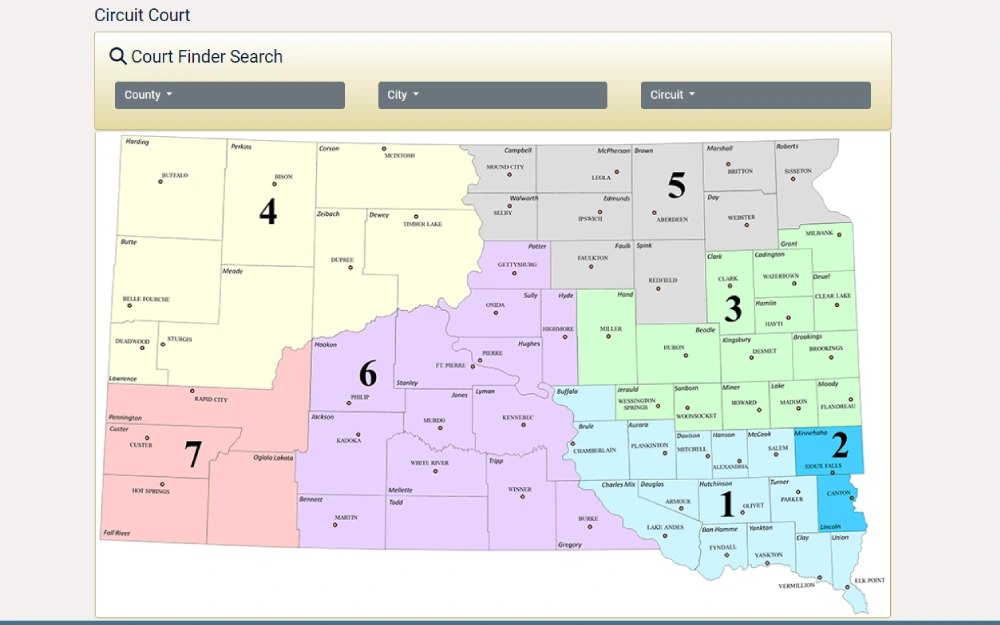
The Minnehaha County Clerk of Court is the records custodian for all divorce decrees filed within the county. Those interested in obtaining divorce decrees may contact the office using the information below:
Minnehaha County Clerk of Court
425 North Dakota Ave.
Sioux Falls, South Dakota 57104
Phone: 605.367.5900
The office is open to the public 8:00am – 5:00pm Monday – Friday.
The Pennington County Clerk of Court maintains divorce decrees filed in its county court. Reach out to the office using the following contact information:
Pennington County Clerk of Court
315 Saint Joseph Street, Unit 5
Rapid City, South Dakota 57709
Phone: 605.394.2570
The office is open to the public 8:00am – 4:55pm Monday – Friday.
The Lincoln County Clerk of Court stores divorce decrees that have been entered into in the county jurisdiction. If someone has been divorced in Lincoln County, you can obtain the decree by contacting the office.
Lincoln County Clerk of Court
104 North Main St.
Canton, South Dakota 57013
Phone: 605.987.5891
The office is open to the public 8:00am – 5:00pm Monday – Friday.
The Clerk of Court is the record custodian of divorce decrees filed within the county. You can obtain a decree by contacting the office.
Brown County Clerk of Court
101 SE 1st Ave.
Aberdeen, South Dakota 57402
Phone: 605.626.2451
The office is open to the public 8:00am – 5:00pm Monday – Friday.
The Brookings County Clerk of Court maintains divorce decrees filed within the county.9 For information on how to obtain a decree, contact the office using the information below:
Brookings County Clerk of Court
314 6th Ave., Suite 6
Brookings, South Dakota 57006
Phone: 605.688.4200
The office is available to the public 8:00am – 5:00pm Monday – Friday.
Divorce records maintained by county clerks are limited to more recent cases. Learn how to view historical divorce archives below.
Tracking Family Lineage & Genealogy Through South Dakota State Divorce Archives
The South Dakota State Historical Society maintains archived divorce records in various collections of historical documents. These collections are included in the South Dakota State Archives Repository where divorce records from the 19th century may be found.
Generally, these records could be researched by any member of the public by visiting the Cultural Heritage Center.10 However, the Cultural Heritage Center is currently making renovations and relocating, and will not reopen to researchers until 2025.
Nonetheless, researchers may still contact the Center where staff may perform historical divorce record searches. It is unclear whether this service has an associated fee. To submit a research request, contact the office at 605.773.3804 or email the archives reference desk at [email protected].
Interested persons may also submit a request by mail to:
South Dakota State Archives
900 Governors Dr.
Pierre, South Dakota 57501
Researchers should ensure that the requests are as detailed as possible and include the collections they want staff to search.
When researching historical divorce records for genealogy purposes, it is best to place an order through postal mail with the South Dakota Department of Health.11
How To Find Dissolutions of Marriage in South Dakota
Under South Dakota divorce and separate maintenance law, courts may order a dissolution of the marriage.12 Courts will issue such an order if it finds that there is enough evidence to prove the marriage has irreconcilable differences (substantial reasons for the couple to not continue the marriage).
Additionally, courts will not enter an order for a dissolution of a marriage if one of the parties objects.
A dissolution of a marriage is effectively a divorce in South Dakota, and members of the public can view information pertaining to these court cases through the court case search. Inquirers may also contact the Clerk of Court in the county where the dissolution of marriage took place to find divorce records.13
How To File for a Divorce & Respond to Divorce Petitions (South Dakota Divorce Process)
There are several steps that people must complete when filing for divorce in South Dakota. First, the plaintiff, or person who is filing for divorce, must be a resident of South Dakota at the time the divorce is commenced. The divorce must be filed in either the county where the plaintiff resides or where the defendant resides.
Ultimately, the defendant will have the final say as to whether they want the divorce heard in the county where they reside.
The South Dakota Legal Self-Help is a free service that helps citizens file for divorce.14 It provides assistance and forms to those seeking a divorce without legal representation and information on how to file.
A plaintiff must determine the ground for divorce. South Dakota divorce law establishes the legal grounds for getting a divorce:
- Adultery
- Extreme cruelty
- Willful desertion
- Willful neglect
- Habitual intemperance
- Conviction of a felony
- Irreconcilable differences
Only irreconcilable differences is considered a no-fault divorce, while the other grounds lay fault on the other party.
Next is when the divorce papers are filed with the court and served to the defendant. A plaintiff must complete several documents, including the Case Filing Statement, Summons, Complaint with children or Complaint without children, and Financial Affidavit.15
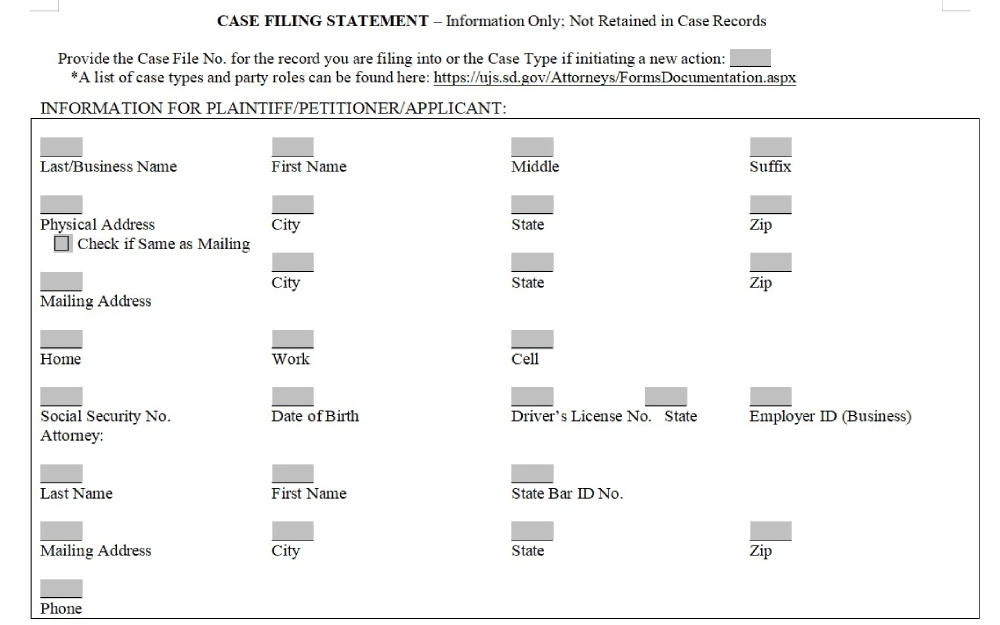
The Summons and Complaint must be served to the defendant. Divorce filing fees are $95.
Once a defendant receives notice of the divorce, they may complete an Admission of Service of Summons and Complaint and Financial Affidavit.
They may also complete an Answer to the Complaint, and a Case Filing Statement. Failure to complete these documents will likely result in the divorce going forward uncontested, with the plaintiff’s Complaint controlling the outcome of the proceeding and the defendant relinquishing their rights by default.
Next, the parties must determine what happens to their property, children, and financial support.
The parties may enter into arbitration to reach an agreement but it is not required. If both parties agree to the terms of the divorce, this is called a stipulated divorce. If not, it is called a contested divorce and the parties will have a hearing where a judge will determine what happens to the property, children, and alimony.
Because there is no common law marriage in South Dakota, there is also no common law divorce. An ex-wife or husband can only divorce their spouse if they are legally married with a marriage license.
There are many ways for an individual to look up divorce records. By using this resource, anyone can find out how to obtain South Dakota divorce records.
References
1South Dakota Legislature. (n.d). Codified Law 34-25-52.6. Retrieved December 05, 2023, from <https://sdlegislature.gov/Statutes/34-25-52.6>
2South Dakota Legislature. (n.d). Codified Law 34-25-52. Retrieved December 05, 2023, from <https://sdlegislature.gov/Statutes/34-25-52>
3United States Census Bureau. (2022). S1201: Marital Status. Retrieved December 05, 2023, from <https://data.census.gov/table/ACSST1Y2022.S1201>
4South Dakota Department of Health. (2023, July 18). Vital Records Fees. Retrieved December 05, 2023, from <https://doh.sd.gov/licensing-and-records/vital-records/order-vital-records/vital-records-fees/>
5South Dakota Department of Health. (2023, October 02). Vital Records Eligibility & Identification. Retrieved December 05, 2023, from <https://doh.sd.gov/licensing-and-records/vital-records/order-vital-records/vital-records-eligibility-identification/>
6South Dakota Department of Health. (n.d). South Dakota Vital Records Request. Retrieved December 05, 2023, from <https://doh.sd.gov/media/enwfylbq/stateapplication.pdf>
7South Dakota Department of Health. (n.d). Find a Register of Deeds Office. Retrieved December 05, 2023, from <https://doh.sd.gov/licensing-and-records/find-a-register-of-deeds-office/>
8South Dakota Unified Judicial System. (n.d). Circuit Court – Court Finder Search. Retrieved December 05, 2023, from <https://ujs.sd.gov/Circuit_Court/Default.aspx>
9South Dakota Unified Judicial System. (n.d). Third Judicial Circuit. Retrieved December 05, 2023, from <https://ujs.sd.gov/Third_Circuit/Links/Counties.aspx>
10South Dakota State Historical Society. (n.d). Archives – Research Services. Retrieved December 05, 2023, from <https://history.sd.gov/archives/research.aspx>
11South Dakota Department of Health. (2023, October 02). Genealogy Resources. Retrieved December 05, 2023, from <https://doh.sd.gov/licensing-and-records/vital-records/genealogy-resources/>
12South Dakota Legislature. (n.d). Codified Law 25-4-17.2. Retrieved December 05, 2023, from <https://sdlegislature.gov/Statutes/25-4-17.2>
13South Dakota Unified Judicial System. (n.d). eCourts Clerk of Court Contact. Retrieved December 05, 2023, from <https://ujs.sd.gov/media/odyssey/eCourts_Clerk_of_Court_Contact.pdf>
14South Dakota Legal Self-Help. (n.d). General Divorce Page. Retrieved December 05, 2023, from <https://ujslawhelp.sd.gov/divorce.aspx>
15South Dakota Unified Judicial System. (2021, October). Case Filing Statement. Retrieved December 05, 2023, from <https://ujs.sd.gov/uploads/forms/CASE%20FILING%20STATEMENT%20Fillable.docx>
